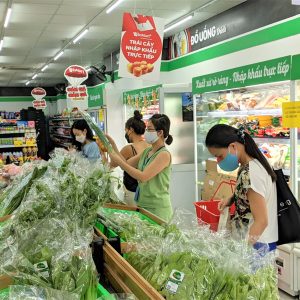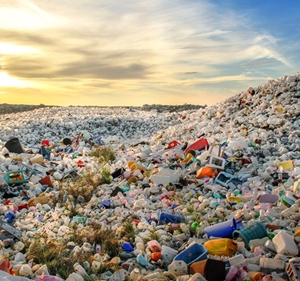With the consistent view that economic development must go together with environmental protection, over the time, the Government has issued and is continuing to improve the system of mechanisms and policies on environmental protection, promoting the collection, sorting, recycling, reuse of solid waste, towards building a circular economy in Vietnam.
However, like many countries in the world, Vietnam is facing a huge challenge due to environmental pollution and climate change, especially the emerging problems of solid waste in general and plastic waste pollution at alarming level in particular. According to incomplete statistics, each Vietnamese family usually uses 5-7 plastic bags for a day, including big bags, small bags and micro-bags,… Thus, millions of plastic bags are used and discharged into the environment every day. The habit of using these products daily is polluting the environment and affecting human health.
In order to proactively provide information about the situation of plastic waste pollution, highlight the policies and solutions to fight with plastic waste of the Government in the coming time, acknowledge proposals and recommendations from the citizens, enterprises and managers around this issue, on November 14, the Government E-Portal held a talkshow about “Against plastic waste”.
Guests of the talkshow:
Mr. Vo Tuan Nhan, Deputy Minister of Natural Resources and Environment
Prof. Dr. Dang Thi Kim Chi, President of Science and Technology Council, Vietnam Association of Nature and Environment Protection
Ms. Tran Thanh Phuong, Deputy Director of Business Department, representative of An Phat Holdings
Journalist Hoang Quoc Dung of Tien Phong Newspaper
Content of the talkshow:
Recently, the Government has issued many mechanisms and policies on environmental protection in general, including promoting the collection, sorting, recycling, and reuse of plastic waste. Would you please share about solutions as well as initial results achieved?
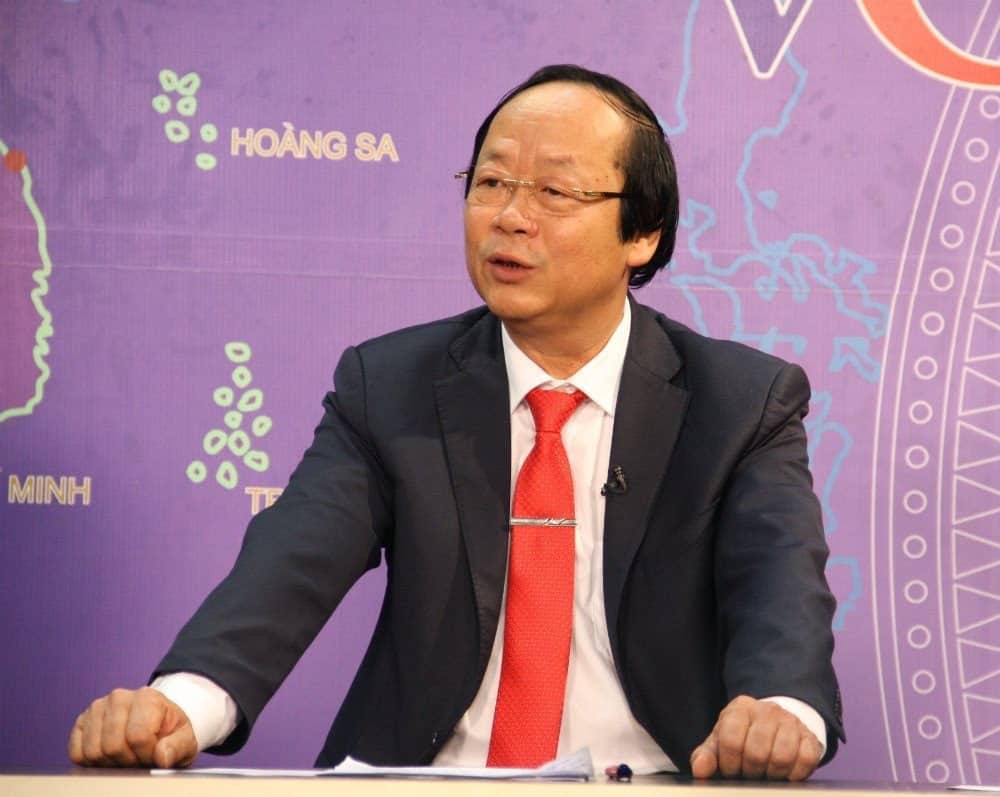
Mr. Vo Tuan Nhan: The Government has clearly seen the harms of plastic waste and disposable nylon bags. In 2011, the Government submitted to the Congress for approval of the Law on Environmental Protection Tax, which stipulates that non-eco-friendly plastic bags are one of the subjects subjected to tax. In 2012, the Ministry of Natural Resources and Environment issued Circulars 07 regulating that eco-friendly plastic bags are exclude from taxes and are labeled as green. In 2013, the Prime Minister approved the project “Strengthening environmental pollution control for plastic waste and plastic bags”. After that, ministries,departments and localities conducted many activities such as national and international scientific conferences, training courses, advocacy to people and taking impacts on environmental pollution control for plastic bags. In 2018, the Prime Minister approved a national adjustment strategy for integrated solid waste management, which specifies the roadmap and control methods for plastic waste and plastic bags. In October 2018, under the direct guidance of Prime Minister Nguyen Xuan Phuc, the Ministry of Natural Resources and Environment held a launching ceremony of the national movement against plastic waste. In April 2019, the Prime Minister sent a letter to local authorities, enterprises and residents throughout the country to call for “the whole country join hands to fight against plastic waste and plastic bags”. Especially, on June 9, the Prime Minister directly commanded and participated in calling the whole country to fight against plastic waste.
The Vietnam Fatherland Front and the Ministry of Natural Resources and Environment met with 14 religious organizations throughout the country to discuss about environmental protection and climate change response, focusing on the fight against plastic waste and plastic bags. The Ministry of Education and Training called all schools, urged students to join the movement to fight against plastic waste and plastic bags. The Youth Union constantly acted, not propagating anymore. Local authorities, where had plastic waste stated by the mass media, took immediate measures to handle. Enterprises combined to form alliances against plastic waste. For example, the Vietnam Plastic Packaging Alliance, initially with 12 large corporations formed. The Ministry of Natural Resources and Environment signed a commitment with this alliance. Currently, the alliance has grown in number of members.
As an enterprise that produces eco-friendly plastic products, would you like to share some information about the production situation as well as the requirements of Vietnamese and the world market with these products?
Ms. Tran Thanh Phuong: With a clear operating principle, we are striving to become the leading enterprise in high-tech and environmentally-friendly plastics in South East Asia. With a production ecosystem of more than 13 member companies and more than 19 factories, we are focusing on 6 key areas: Packaging solutions; 100% compostable materials and environmentally friendly products; high-tech and environmentally friendly building materials; high-tech plastic; precision mold; industrial real estate. An Phat Holdings affirmed its position in the world market with total revenue of 2019 reaching VND 12,000 billion (more than 50% of revenue came from export markets). An Phat Holdings also affirmed its name through important markets in the world, such as USA, Europe, Japan, …

100% compostable and eco-friendly materials is one of our focus fields. This is an important step of An Phat Holdings. The trend of the world is gradually shifting to environmentally friendly products, which replace traditional plastic bags lasting from 200 to 500 years to decay completely. An Phat Holdings is offering solutions which have better impact on the environment, such as 100% compostable bags. Products of An Phat Holdings are 100% compostable in normal conditions from 6 months to a year into humus, water and CO2.
In Vietnam, the growth rate of the plastic industry is increasing according to the requirements of the residents. The plastic packaging industry accounts for 35% of the total, revenue from this industry is about 15 billion USD per year. Therefore, according to a statement from the Government, in 2025, Vietnam will ban all disposable plastic bags. This means that we need a solution for replacement products and An Phat Holdings is providing this solution.
Overall, the habit of using disposable plastic products is still popular among the majority of residents. From the perspective of an expert, how do you think about the alarming level of plastic pollution in Vietnam?
Ms. Dang Thi Kim Chi: Collecting, recycling, reuse and handling of persistent plastic products and disposable plastic bags in Vietnam are still challenging. Incomplete treatment and bad management lead to harms to the environment and affect human health. We know that, in nature, hard-to-break plastic products, plastic bags can survive for several hundred years. This existence will affect the composition of soil and water. If plastic bags are treated by heat, there will be a lot of toxic gas released to the human body. Using plastic bags in daily activities as a habit has led to increasing plastic waste. In Hanoi, every day people emit 5,000 tons of garbage, of which about 7% -8% are nylon or persistent plastic products. This situation warns us that if we do not see the harmful effects of plastic bags and plastic waste, not only our generation but also the next generation will suffer heavy consequences.
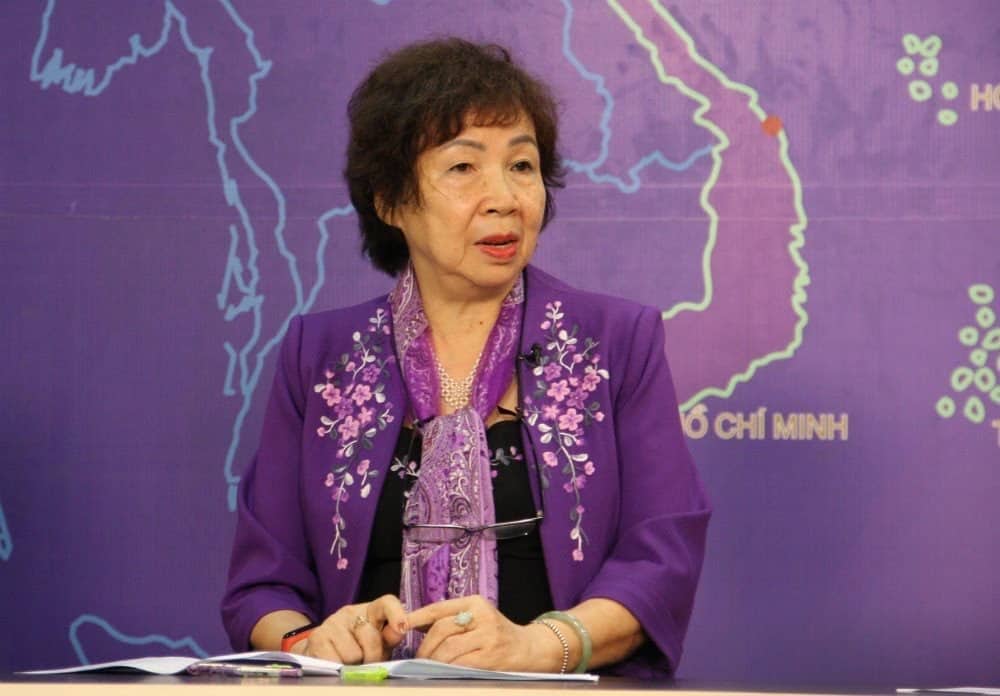
Would you like to share more about Ms. Dang Thi Kim Chi’s warning about the alarming situation of plastic pollution nowadays?
Mr. Hoang Quoc Dung: I would like to add that solving the environmental problem, including pollution of persistent plastic waste, does not seem to go together with social – economy development. For example, Bac Ninh Province is the smallest Province in Vietnam but has a huge attraction for foreign investment (US $ 18 billion), all of the industries are high-tech. However, if anyone goes on Highway 18 from Hanoi to Quang Ninh, through Bac Ninh, the first image we see is two huge mountains of garbage. As far as we know, the stronger the economic development, the greater the level of plastic waste used there. This is related to the intervention to minimize the use of persistent plastic products.
We seem to stop at the level of propaganda, but in action or perception, it is difficult to change. For example: In Vietnam, there is a special feature that we ‘wear plastic on the head’. However, there is a large number of helmets we wear that do not meet the standard. Usage time of these helmets is very low. Disposing unused helmets leads to a double problem.
We have issued a series of policies but we have not had the statistics about the effectiveness of these policies. So what is the validity of these policies? If we do not solve plastic waste problem well, it shows that we are lacking of readiness, at the same time, it is also a test of the management efficiency of national management authorities.
How do you assess the situation of increasing plastic waste and the risk of environmental pollution due to plastic waste today?
Mr. Vo Tuan Nhan: Along with the process of industrialization, urbanization and human activities, the amount of plastic waste and disposable plastic bags is increasing. We all know that plastic products take hundreds or even thousands of years to decompose. Many products after being thrown away disintegrate into very small pieces of plastic, together with micro particles of plastic mixed with food and drinking water, directly affecting human health, ecosystems, especially marine ecosystem.
It is estimated that plastic and plastic bags account for about 6-8% of total domestic solid waste. Accordingly, a large amount of plastic waste and plastic bags are released into the environment, increasing a serious threat to the environment of soil, water and air if not collected and treated thoroughly. In addition, plastic waste and plastic bags enter the inland flow system and are transported to the river then sea, decaying into small pieces. So, marine organisms can swallow them, affecting respiration or the digestive system, or entering the food chain, being a threat to the environment and ecosystem.
Plastic waste is increasing, especially from the use of disposable plastic products and persistent plastic bags. The plastic bags waste is mainly treated by landfilling because the recollecting value for recycling is low. Disposable plastic waste and plastic bags, if not well controlled, will adversely affect the living environment.
Clearly, plastic waste pollution has become an alarming problem and plastic waste disposal is extremely urgent. Dear Ms. Dang Thi Kim Chi, we have had a lot of policies restricting the use of disposable plastic products, however, are these policies not strong enough, do you have any suggestions in the future?
Ms. Dang Thi Kim Chi: From current situation and research activities, I propose to promote the propaganda to consumers. So, they voluntarily reduce the use of persistent plastic bags, actively change these bags by using compostable plastic bags (biological materials, bamboo, paper, wood,…) to reduce consumption, leading to reduced waste. This is a very important factor.
In addition, it is necessary to proceed to ban the use of persistent plastic products and disposable thin plastic bags. There are some ideas that doing so will cause confusion, not enough substitutes, pushing manufacturing enterprises into difficulties. But when it is banned, enterprises, residents and society must be forced to find new and environmentally friendly alternatives.
Another solution is to minimize the generation of this type of waste, conduct recycling, and reuse in forms that are beneficial to the environment. For example: Mechanically recycling nylon bag products into asphalt, chairs, fences, like some foreign countries do. Higher is the chemical method, or the method of heat decomposition treatment, taking advantage of the heat of plastic waste in cement kilns, taking that heat to compensate for the fuels we are using today.
At the same time, it is necessary to apply the improvement of good, new and most convenient science and technology. So, the production process produces the least persistent plastic waste. Researching the technological process for producing biodegradable products such as bioplastics, bamboo,… These studies need to quickly apply to life.
The last problem is about the market economy. Plastic bags are very cheap, while new and environmentally friendly products are expensive. Measures must be taken to support the economy against the threat of widespread plastic waste; encourage the production of eco-friendly products; heavily tax the organizations that generate much waste; tax the consumers …
From the perspective of an enterprise, do you agree with the view that it is necessary to supplement and strongly increase economic tools to adjust consumption behavior in an environmentally friendly way? Do you have any specific suggestions on this?
Ms. Tran Thanh Phuong: The adjustment of consumer behavior needs multi-dimensional coordination. I strongly agree with Professor Kim Chi’s opinion that we need to focus on advocacy and knowledge provision for consumers. When they are knowledgeable, they are confident enough to turn their choices into a new consumption habit. It is necessary to make the market be able to meet the substitutes, because when the perception changes and the market follows, it will not have much value.
The trend of environmentally friendly consumption is often expensive. Clearly, when we have to invest short-term money to gain long-term benefits that are difficult to measure, indirectly related to human health and environmental protection, if people’s awareness is not sufficient enough, it will not be possible to form a new consumption habit.
In order to help environmentally friendly products reach the market and compete, the market size and social awareness must be large enough. In addition to the tools of policy and management institutions, economic tools are also needed to change consumer behaviors. I recommend having 2 groups of tools: Firstly, products that are harmful to the environment such as disposable plastic bags, plastic, we need to apply stronger taxes and fees on these products. Secondly, the group of economic tools is to support and reduce taxes for enterprises and consumers who choose environmentally friendly products. Besides, the Government should consider increasing subsidies, funding, and promoting funds to help enterprises produce environmentally friendly products.
Could you tell us the taxable objects and environmental protection tax rates for persistent plastic bags now?
Mr. Vo Tuan Nhan: The Government has submitted to the Congress for approval of the Law on Environmental Protection Tax (effective from 1 January, 2012). The law states that eco-friendly plastic bags are one of the subjects that are subject to environmental protection tax. The Government also continued to propose to the Congress to raise the environmental protection tax rate for persistent plastic bags in Resolution No. 579/2018/UBTVQH14 on 26 September, 2018 of the Congress Standing Committee (raise the tax rate from VND 40,000/kg to VND 50,000/kg).
In the coming time, the Ministry of Natural Resources and Environment will continue to coordinate with the Ministry of Finance to evaluate the effectiveness of environmental protection tax policies so as to have economic solutions and tools for enterprises which produce disposable plastic items and persistent plastic bags.
From a consumer perspective, do you support the proposal to increase the economic tools to combat plastic waste? Do you have any specific suggestions to change the current consumption habits of people from using plastic bags, convenient plastic products to using environmentally friendly plastic products with higher prices?
Mr. Hoang Quoc Dung: It’s time we need to use strong economic tools, physical strength besides communication and propaganda. We have to change our minds and impose economy on consumption more than production. The habit of users for decades has been difficult to change, unless there is a certain level of economic sanctions. For example, it is possible to tax at supermarkets and establishments that use persistent plastic bags instead of encouraging them. Or the neighborhood has 6 socio-political organizations, must apply the economic mechanism in the residential area is to limit the generation of plastic waste. The tax for manufacturers of disposable plastic must be higher.

Regarding to the shift of consumer habits, this is a big issue of communication. Habit is a category of morality. Changing morality cannot be quick, so, using communication to change habits (actually changing morality), is not enough. The process of changing routines is often jump-taking, over a long period of time to change habits. But there’s still the sudden jump, that’s what we need. I propose this sudden jump is firstly an exemplary factor. For example, senior leaders say how to handle garbage at home. Or in big events like the matches of the Vietnamese football team, we put the message about fighting plastic waste to impact on the masses, instead of talking in documents,… it will gradually form a habit.
Please let us know your opinion about the importance of communication activities against plastic waste?
Mr. Vo Tuan Nhan: Communication on raising awareness against plastic waste is very important. The Ministry of Natural Resources and Environment regularly cooperates with ministries, departments and local authorities to organize many seminars to share, communicate and propaganda about the harmful effects of the persistent disposable plastic bags, encouraging the community to strengthen to reuse plastic bags, use more eco-friendly products like biodegradable plastic bags.
In order to spread plastic waste management activities, the Ministry of Natural Resources and Environment has launched a nationwide “Against plastic waste” movement (Official Letter 5539/BTNMT-TTTNMT on 10 October, 2018) in order to call for direct participation of community, encourage consumers to stop the behavior or habit of using persistent plastic bags, disposable plastic, encourage the use of compostable, recyclable products and eco-friendly products; call for enterprises, supermarkets and shopping centers to use new eco-friendly materials to replace disposable plastic products.
Specially, on 9 June, 2019, in Hanoi, the Ministry of Natural Resources and Environment collaborated with the Central Committee of Ho Chi Minh Communist Youth Union and Hanoi People’s Committee to organize a nationwide launching ceremony of “Movement against plastic waste”. At the ceremony, Prime Minister Nguyen Xuan Phuc called for the business community to improve social responsibility, join hands to combat plastic waste, actively participate in the classification, recollecting, recycling, reuse of plastic bags, disposable plastic products; stores, supermarkets, restaurants, resorts, services, hotels,… do not use plastic bags, disposable plastic products; encourage consumers to bring their own packagings, reusable bags and use eco-friendly products. It is necessary to set high political determination, and strive, by 2021, stores, markets, supermarkets in urban areas will not use disposable plastic. By 2025, the country will not use disposable plastic.
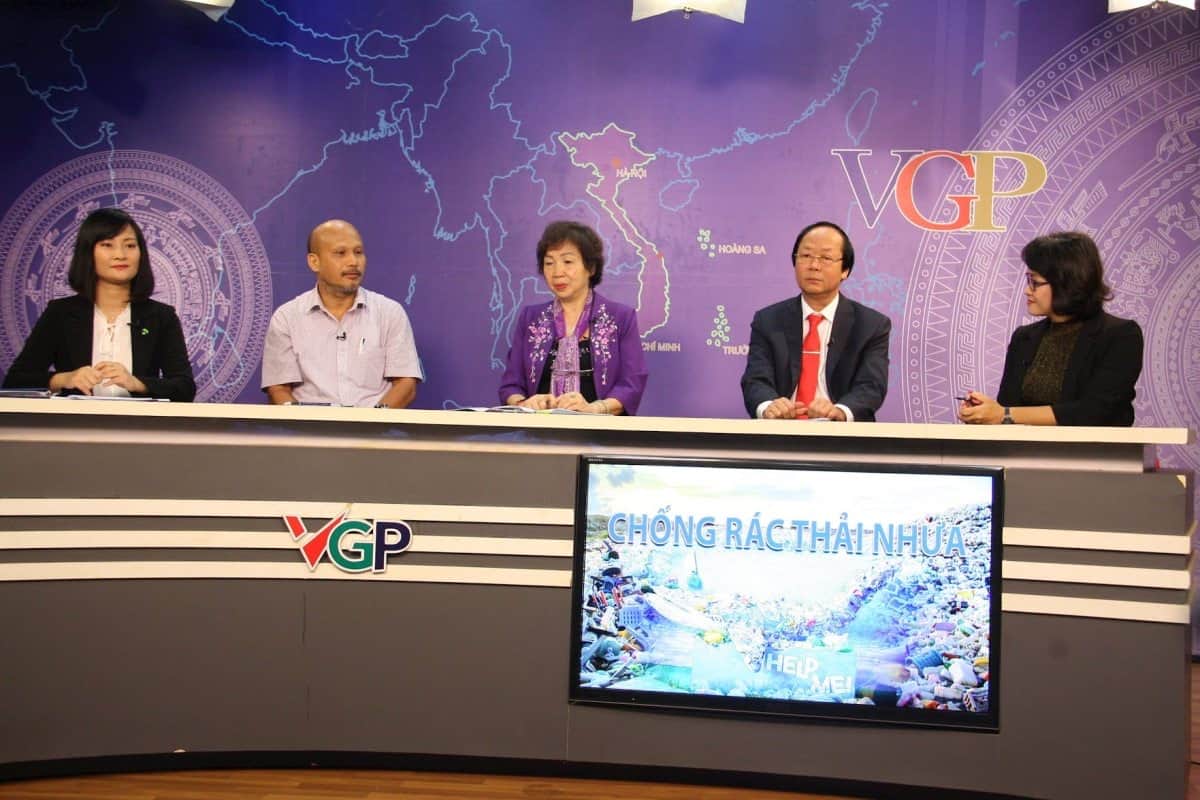
The Ministry of Natural Resources and Environment held a Signing Ceremony to participate in the movement “Against plastic waste” with representatives of socio-political organizations, supermarkets, enterprises, non-governmental organizations; coordinated with news agencies and newspapers to promote propaganda about the risk of plastic pollution in order to change habits, proceed to abandon the habit of using plastic bags and disposable plastic products of people. With the carried-out activities, the eco-friendly plastic bags and products that replaced the disposable plastic products were gradually gaining a position in the market, especially in supermarkets and large shopping centers across the country (Big C, Fivi Mart, Aeon, Coop mart, Vinmart, Maximart,…)
Through researching export markets, what do you share about the experience in combating plastic waste in other countries, especially the policies for enterprises that produce eco-friendly alternatives?
Ms. Tran Thanh Phuong: An Phat Holdings has conducted thorough research on the policy of banning and restricting disposable plastic products in export markets. These prohibitions or restrictions are on many different levels but most of them affect last consumers. We also study and find that just policies that prohibit or restrict taxation are not effective enough to change consumer behavior. The problem is that we have to offer accessible substitutes for consumers.
For enterprises that are producing eco-friendly alternatives such as An Phat Holdings, a large investment in technology is required, while the cost of input materials for the production of self-decomposed plastic products is very high. That is why substitutes are hard for consumers to reach.
Through the sharing of enterprises, please let us know your opinion before proposing that the Government should have more policies to support enterprises to change production technology in an environmentally friendly way towards building circular economy in Vietnam?
Mr. Vo Tuan Nhan: The management of plastic waste and plastic bags is a matter that should be done in drastically, regular, synchronous and unified way with the cooperation of many departments, residents, enterprises and the society. The Ministry of Natural Resources and Environment supports and is reviewing policies to support the conversion of production of disposable and persistent plastic bags to paper bags and eco-friendly packaging; Promotes the market for environmentally friendly bags. We are also coordinating in research, proposing waste management mechanisms and policies, including plastic waste, on the principle that the person generates the waste must pay; Proposal to expand governmental credit that supports for recycling and reuse of plastic and plastic waste projects as well as incentives for taxes, fees and charges. At the same time, gradually creating consumer markets for eco-friendly bag products; promoting scientific research, application and transferring technology of recycling of non-biodegradable plastic bags into more eco-friendly products. All of these solutions are aimed at promoting the construction of circular economy in Vietnam.
Recently, at the launching ceremony of the national movement against plastic waste, Prime Minister Nguyen Xuan Phuc made the goal clear: by 2021, stores, markets, supermarkets in urban areas will not use disposable plastic products; by 2025, the country will not use these items. This is a great determination of Prime Minister. In the future, what solutions that will be advised by the Ministry of Natural Resources and Environment to Government to perform effectively?
Mr. Vo Tuan Nhan: Currently, the Ministry of Natural Resources and Environment is reviewing, proposing and advising the Government many solutions, but in general, there are some following main groups of solutions:
Firstly, forming mechanisms, policies and laws to limit the situation of plastic waste causing environmental pollution such as: Drafting a revised Law on Environmental Protection, focusing on policies to support and encourage enterprises and people invest, produce and use eco-friendly materials, increase recycling and reuse of waste; Advise the Government on amending and supplementing a number of articles of Decree No. 155/2016/ND-CP on 18 November, 2016, on sanctioning of administrative violations in the field of environmental protection, with special attention paid to sanctions for strictly handling acts of discharging waste causing environmental pollution; Submit to the Government for consideration and promulgation in 2020; Advise the Prime Minister to consider and amend Decision No. 73/2014/QD-TTg on 19 December, 2014 on the list of scrap permitted to be imported in the direction of allowing only the import of high-value of recycling plastics; Suggesting a high tax on disposable plastic products; Tax exemption or reduction for eco-friendly products.
Secondly, promoting scientific research, application and technology transfer of recycling of plastic waste into more eco-friendly products; producing eco-friendly products to replace, such as bags, bottles,…
Thirdly, promoting communication activities to raise awareness about the harmful effects of plastic-based products, disposable plastic bags on the environment, ecosystems and human health; regularly launching movements against plastic waste.
Fourthly, clearly defining the responsibilities of local authorities: People’s Committees of provinces and cities organize the implementation of the above solutions. It is important to restrict and proceed to terminate the import, production and supplying persistent plastic bags since 2026 at trade centers and supermarkets for living purposes. Propagating, campaigning and organizing the commitment to fight against plastic waste, not to use disposable plastic products for production establishments, product distribution organizations, trade centers, shops, restaurants, markets, supermarkets; Developing and organizing the implementation of pilot models to limit the use of persistent bags, Shifting from the use of plastic bags to other types of paper and packaging bags; Promoting the market for eco-friendly bags; Strictly control activities of producing persistent plastic bags, especially household-scale production groups; Strengthening inspection and supervision of production and consumption of persistent plastic bags and disposable plastic products; Supporting and promoting activities of collecting, recycling and reusing waste in general and plastic waste in particular.
Sincerely thank all the guests for attending this talkshow!
Source: Baochinhphu.vn

